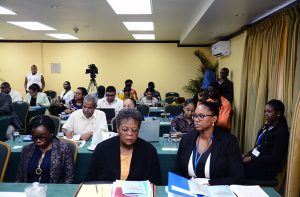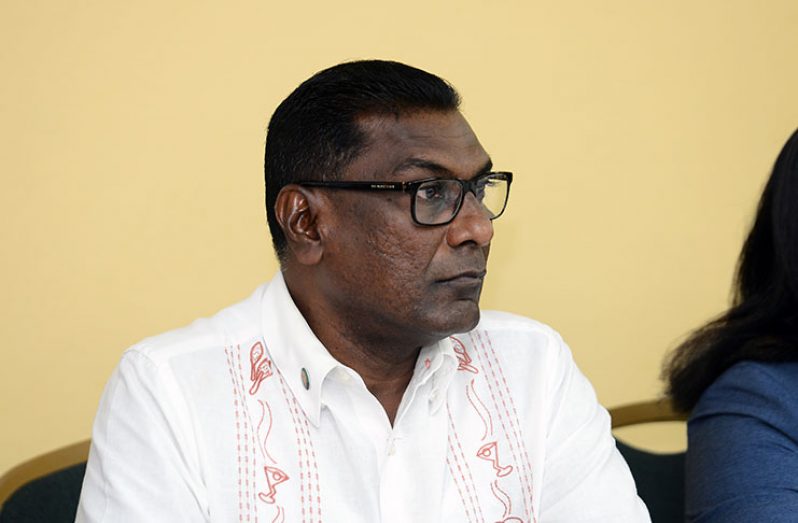CHIEF Medical Officer (CMO), Dr. Shamdeo Persaud, said that, while the influx of migrants in Guyana poses a challenge to the Health Sector, healthcare services must be provided to all, regardless.
Addressing some of the country’s senior medical personnel, during the opening of the Regional Health Officers’ Meeting at Cara Lodge, yesterday (Wednesday, March 6, 2019), Dr. Shamdeo said that it was sad to learn that migrants were recently turned away, during their attempt to access healthcare services.
“I must appeal to you all that we really need to ensure that our visitors and our new migrants have access to our services. We should not be hearing reports as we did in the past week of persons being turned away from our facilities,” the CMO implored the Regional Health Officers. A child was among the persons who were turned away.
Dr. Persaud said it was clear that some healthcare personnel, within the Public Health Sector, were not cognizant of the policy of the Government of Guyana, on the treatment of migrants. “Even if someone is visiting us, we should ensure that we provide such care,” he emphasized.
With assistance from the Pan American Health Organisation/World Health Organization (PAHO/WHO), the Public Health Ministry has been forging ahead with its Expanded Programme on Immunisation (EPI) to reduce the spread of Vaccine-Preventable Diseases. Dr. Persaud noted, that, in crisis situations or where there is an increase in migrants, as a result of a crisis, diseases such as measles and polio increase.
On the sideline of the meeting, the CMO explained that it was the policy of the Ministry of Public Health to immunize migrants and visitors to prevent the spread of Vaccine-Preventable Diseases.
“For the persons coming with children, immunization will be offered to those children to ensure that they are not capable of transmitting, to the local population, or to others, any communicable diseases that can be prevented by vaccines. So the policy of the Ministry is actually to give them vaccine. We extended also to include adults who may not have been covered,” he explained
In the Hinterland Regions, the CMO reported that there was an increase in vector-borne diseases. “Persons are not only acquiring vector-borne diseases including malaria but also coming in with strains that might even be resistant to some of the drugs that we are using,” Dr. Persaud reported.
He told the Regional Health Officers that the arising challenges are not limited to the regions or communities lining the border with Venezuela. According to him, it was a national issue.
“Please do not feel this is a problem for Regions One, Seven, Eight and Nine, which border the concerned areas, for persons are travelling all over Guyana. As a matter of fact there might be the largest number right here in Georgetown. So this is not a border issue, this is a Guyana issue,” the CMO said.
The CMO has instructed health facilities across the country to compile adequate data on the health needs of the migrants, so as to allow the Public Health Ministry to plan more effectively.
“We have medication based on our estimates, we do a forecast and based on Guyanese, how many people we have calculated with diabetes, hypertension, we purchase that amount of medication, and I could tell you it is not enough. So imagine you are adding unto to that 10-15 per cent more,” he explained. It is estimated that more than 4,000 Venezuelan migrants are here in Guyana. The country has also seen an influx of visitors from Cuba.

That aside, Dr. Persaud told the Regional Health Officers that the two-day meeting presented an opportunity for them to take stock of challenges and successes of 2018, as they moved into 2019. He reminded the audience that 2019 was the penultimate year for the implementation of Health Vision 2020 which was developed in 2013, revised in 2016 and had set the foundation for the expansion of health services across Guyana.
Since 2013, he said the country had seen an expansion of critical health services to many remote villages. It was pointed out that, to date, 54 health facilities across Guyana, both public and private, had been licensed. “We are looking to have all of our facilities, at some point in time, adequately licensed meaning that they will meet all of the standards for operating health facility within our jurisdiction,” the CMO told the health personnel.
He said there had been an improvement in the ‘distribution’ of doctors across the country, particularly in far-flung communities. However, shortages of drugs and medical supplies remained an issue that the Public Health Ministry continued to address, though there were some improvement in the procurement system.
Minister within the Ministry of Public Health, Dr. Karen Cummings, said the forum created the platform on which the Regional Health Services Department could strategically plan for the enhanced delivery of public healthcare services.
She urged the healthcare professionals to develop efficient and effective ways to provide their services, based on lessons learnt. “I am very confident that much effort will be spent addressing the future of public healthcare delivery within the region through the refinement of policies, the increased use of information and communication technologies and the judicious deployment of medical personnel throughout the regions,” Minister Cummings said.
The opening ceremony was also attended by PAHO/WHO Country Representative, Dr. William Adu-Krow; Director of Regional Health Services, Dr. Kay Shako; Regional Health Services Indigenous Peoples’ Coordinator, Michael Gouveia and Orthopaedic Surgeon, Dr Fawcett Jeffrey, who delivered remarks on behalf of Public Health Minister Volda Lawrence.
The meeting was held under the theme ‘Collaboratively we build a resilient health care system that is acceptable, accessible, timely and appropriate to meet the needs of every person in Guyana.’



.jpg)








